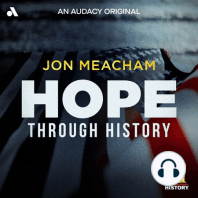3 min listen

Episode 4 | JFK and the Cuban Missile Crisis
Episode 4 | JFK and the Cuban Missile Crisis
ratings:
Length:
43 minutes
Released:
May 12, 2020
Format:
Podcast episode
Description
It is known as the most dangerous moment in human history. In late October of 1962, American spy planes discovered Soviet missile bases with nuclear capabilities on the island of Cuba. Normalcy was put on indefinite pause as millions of Americans grappled with terrifying idea that at any moment, without warning, their communities and loved ones could be decimated by an atomic bomb. While military leaders and hardliners clamored for aggressive action, it was the patience and poise of a president that saved the world from mass destruction.
Learn more about your ad choices. Visit podcastchoices.com/adchoices
Learn more about your ad choices. Visit podcastchoices.com/adchoices
Released:
May 12, 2020
Format:
Podcast episode
Titles in the series (13)
Trailer: Hope, Through History by Hope, Through History